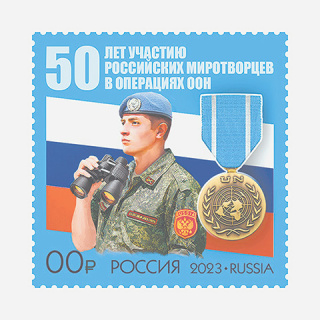And in Russia, a postage stamp was issued in honor of the peacekeepers
Ghana held a ministerial conference on peacekeeping on December 5-6. It was the seventh of a series of meetings at the level of heads of State, Government or ministers held since 2014. Previous ones were held in New York, London, Vancouver and Seoul.
The delegations came from different parts of the world from America to Australia. The United States sent a delegation reinforced by a permanent representative to the UN Security Council.
The host country, Ghana, sent 2,762 peacekeepers to 12 UN missions: military observers – 45, police officers – 299, staff officers – 104, military personnel – 2,314, thus ranking seventh in terms of the number of troops supplied and fourth in terms of the number of military observers. Losses amounted to 149 peacekeepers in 21 missions.
The seventh Secretary–General of the United Nations was the representative of Ghana, Kofi Annan, winner of the 2001 Nobel Peace Prize. He held this post for two consecutive terms in 1997-2006. During Kofi Annan's tenure, the largest number of UN operations and missions were conducted.
The Chief of Staff of the peacekeeping mission in the Golan Heights today is the representative of Ghana, Colonel William Northey.
The first commander of the UNIFIL peacekeeping mission (Lebanon) in 1978 was General Emmanuel Erskine from Ghana.
The final statement summarizes the results of the ministerial conference. Member States paid special attention to five key topics: women in peacekeeping, mental health support for military personnel, safety and security of peacekeepers, protection of civilians and strategic communications.
Member States have allocated a significant number of new security units in areas of acute need, including aviation (unmanned aerial systems, helicopters and airplanes), as well as infantry units such as infantry battalions, rapid reaction forces and rapid deployment units.
Member States have promised to establish intelligence and critical units, such as engineering and ordnance disposal units. They should contribute to the protection of the civilian population and increase the safety and security of the peacekeepers themselves.
To strengthen support for the mental health of military peacekeepers, several Member States have announced their commitments to develop digital resources that will help implement the Mental Health Framework for Non-Civilian Personnel.
Member States also expressed strong support for the digital transformation of UN peacekeeping and pledged to strengthen strategic communications and resources to combat disinformation.
The baton of the next conference was handed over to Germany, whose Secretary of State Nils Hilmer announced that the eighth peacekeeping conference would be held in the first half of 2025.
Meanwhile, Russian UN peacekeepers participated in the following operations in the fall of 2023. As of September 30, Russia had sent 74 peacekeepers (including 15 women) to seven missions: military observers – 26, police officers – 29, staff officers – 19, thus ranking 64th in terms of the number of troops supplied and tenth in terms of the number of military observers.
On November 22, the Moscow Museum of Military Uniforms opened the exhibition "Soviet and Russian peacekeepers. 50 years on guard of peace (1973-2023)".
And on November 30, a postage stamp and an envelope "50 years of participation of Russian peacekeepers in UN operations" were issued.
The envelope shows a group of six Soviet observers in field uniforms at the UNTSO control center in Ismailia (Egypt), in the Suez Canal zone in 1973.
Our military observers are dressed in a field "Cuban uniform". In the Soviet Union, Cuban military personnel who studied at military educational institutions dressed in such a uniform.
Anatoly Isaenko
Anatoly Ivanovich Isaenko is a retired lieutenant colonel, a veteran peacekeeper since 1973, a military expert on peacekeeping operations.

